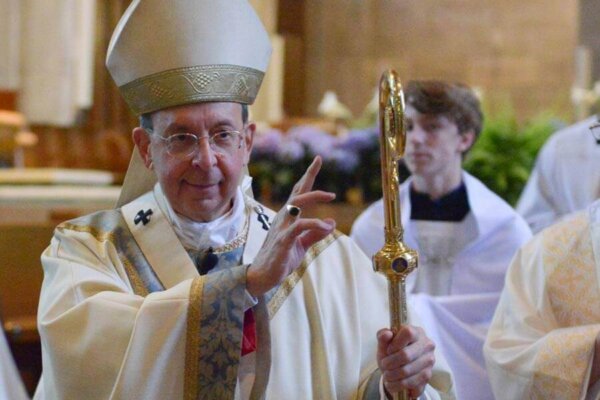Opening Mass of the Holy Spirit
St. Mary’s Seminary, Roland Park
August 28, 2024
The One Thing Necessary
As we begin this new year of formation, what are our hopes? our goals? our fears? No doubt they are numerous and varied. A deeper life of prayer. Clarity in discernment. Improved academic performance. Honing pastoral skills. Love for the poor. Knowledge of self . . . The list is long.
But today let us stick to what is most essential. For in this Mass, we invoke the Holy Spirit not only to help us attain our goals and to overcome our fears, but indeed to keep us focused on the one thing necessary for authentic priestly formation. That one necessary thing is being caught up in the relationship of love that has existed from all eternity between the Father and the Son.
In the Love of Father and Son
In the Gospel, Jesus said: “Whoever loves me will keep my word and my Father will love him.” Keeping Jesus’ word and living in the Father’s love: Isn’t that formation in nutshell? For Jesus’ word is not merely a lofty idea or an ethical ideal. Keeping Jesus’ word means believing in him, encountering him, opening our minds and hearts to him, surrendering to him. And when we encounter Christ, we encounter the Father. ‘We will come and make our dwelling with you’, Jesus promises. This is the one necessary thing: that Christ and his Father dwell in us in the power of the Holy Spirit. Without this, formation is a house built on sand.
That is why priestly formation involves preparation of the mind and heart, formation for discipleship, configuration of one’s entire self to Christ, and the healthy integration of all the dimensions of formation into a well-formed humanity and a generous and fruitful ministry. If we are to be the priests the Church wants and needs, God the Father must see and love in us what he sees and loves in his Son . . . even as God’s People must be able to see and love in us what the Father sees and loves in his Son.
This requires deep humility on our part, for we are always a work in progress. All the more reason, then, for us to take to heart what Jesus says in the Gospel. After instructing us to keep his word, he adds: “The word you hear is not mine but that of Father who sent me.” All that belongs to the Christ – his divinity, his priesthood, his word, he received from Another, from the Invisible Father. So too with us but more so. All that we have and all that we are, we received, undeservedly, from Another. It follows that priestly leadership, indeed, any form of Church leadership, is not a matter of imposing ourselves or our personal views on others. Rather our task is to listen attentively, prayerfully, humbly to a word that is not our own, and then to proclaim to the nations God’s marvelous deeds: to proclaim something and Someone much larger, more beautiful than ourselves and anything our imaginations could ever conjure. As St. John Paul II wrote: “what assiduous study of the word of God, what profound familiarity with Christ and the Father, what a spirit of prayer, what detachment from self must we have in order to say, ‘my teaching is not mine but his who sent me’” (CT, 6).
Hope, Joy, Encouragement
In the reading from Ephesians, St. Paul helps us adhere to the one thing necessary by offering us a vision of hope, joy, and encouragement. Writing from prison, Paul reminded the Ephesians as he reminds us that God the Father chose us in Christ before the foundation of the world, that he has implanted in our hearts the word of truth, that he has sealed us with the Holy Spirit – and that we are already beginning to share in our heavenly inheritance. We are not starting from scratch. We already have “access” and “rights”, so to speak, in the Kingdom of God, the Kingdom of the Beatitudes. God did indeed choose us & he loves us more than we can ask or imagine. Perhaps formation is all about our being truly convinced of this but without taking it for granted or falling into the trap of presumption. For letting ourselves be continually formed anew means letting go, and for me and you, that involves commitment, struggle, sacrifice.
So as you begin this year of formation, let me offer for you the same prayer St. Paul prayed for the Ephesians, namely, that that “. . . the eyes of your hearts may be enlightened, that you may know what is the hope that belongs to his call, what are the riches of glory in his inheritance among the holy ones, and what is the surpassing greatness of his power for us who believe!”
O Holy Spirit, make us understand this one necessary thing! Amen.


